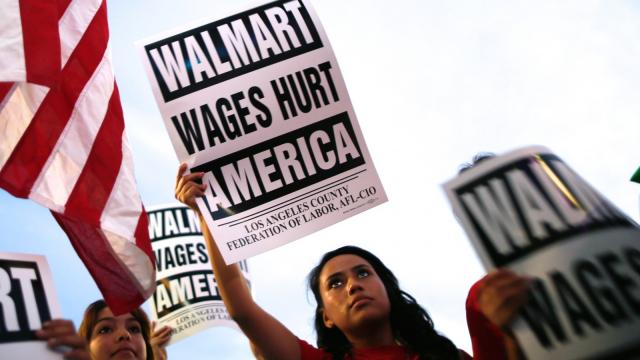
Strikes in 20 cities come as new report says top Walmart bosses received $104 million in taxpayer subsidies over six years
Working mothers at Walmart staged a series of strikes on Wednesday in protest over wages and conditions at the world's largest retailer, as a new report claims the company's top executives received $104 million in taxpayer subsidies over a six-year period.
The majority of mothers working at Walmart, which drew a $16 billion profit last year, earn less than $25,000 a year.
This week, a study by thinktank Demos detailed how 1.3 million women working in retail live on or near the poverty line. It said that if the major retailers in the US raised wages to the equivalent of $25,000 for full-time work, it could lift almost half a million women out of poverty or near-poverty.
“Walmart moms” walked off their jobs to take part in protests outside their stores in a number of cities including Orlando and Chicago, joining those who have already staged strikes earlier this week in Dallas, Pittsburgh, southern California and the Bay area.
Strikes took place in 20 cities on Wednesday. The protesters, who include current Walmart workers as well as members of the allegiance Our Walmart, are demanding annual wages of at least $25,000, more full-time openings and an end to retaliation against workers who speak out against their conditions.
Earlier this year, the National Labor Relations Board filed a complaint against Walmart for, it said, illegally retaliating against 60 workers who had taken part in legally protected strikes or protests.
Mother of three Linda Haluska, 52, who works in a Walmart store in Glenwood, told the Guardian she was traveling to the protest in Chicago. Haluska has worked for the company for eight and a half years and now earns $28,000. She said she was striking in solidarity with others who earn less, and what she described as worsening conditions at the company.
Haluska works the night shift at the store's health and beauty department and supplements her income by working as a teaching assistant during the school term.
“I started off at the bottom, like everyone else” said Haluska. “But I've seen things change: the erratic scheduling, the lack of flexibility. It's hard to get a day off when you want. They make it very clear that Walmart comes first. Your job is always on the line.”
Haluska said that some of her co-workers on the night shift who can't afford cars have to wait outside for up to an hour for the bus to arrive – a situation some staff said was potentially dangerous.
Workers and their trade union supporters are currently making their way to Bentonville, Arkansas, where the annual Walmart shareholders meeting is expected to take place on Friday.
Walmart has been criticized in the past for paying workers such low wages that their workers rely on food stamps and other subsidies.
A report published on Wednesday raised a separate issue over Walmart and tax, in terms of a loophole the study said had given the company a tax break of $104 million, enough to cover the cost of free lunches for 33,000 schoolchildren.
In its report, the Institute for Policy Studies and lobby group Americans for Tax Fairness calculated that between 2009 and 2014, the top eight Walmart executives took home more than $298m in “performance pay” that was fully tax deductible.
The performance pay tax break was made possible by a 1993 change in the tax code meant to discourage excessive executive compensation. The rule capped the amount corporations could deduct from their income taxes for executive pay at no more than $1m per executive. But the law exempted stock options and other so-called “performance pay” from the cap.
“When Walmart gets a $104m tax break for giving its executives outrageous pay packages, [and] the rest of us pick up the tab,” said Frank Clemente, executive director at Americans for Tax Fairness. “With this tax loophole, the bigger the executive bonuses, the less Walmart pays in taxes. This is truly one of the most perverse loopholes of all time.”
“Subsidies for executive bonuses come at a huge social cost,” said Sarah Anderson, global economy project director at the Institute for Policy Studies. “The $104 million in tax subsidies for Walmart’s executive pay over the past six years would have been enough, for example, to cover the cost of providing free lunches for 33,000 children.
"What’s even more outrageous is that this is a company that pays its workers so little that many of them must rely on such public assistance programs.”
The study cites the example of recently retired Walmart CEO Michael Duke. According to the report, the performance pay tax break allowed Walmart to lower its federal tax payments by $40 million for the $116 million in stock options and other performance-based compensation it paid him between 2009 and 2014.
The Demos study, published on Monday, found that women in retail were paid $4 an hour less than men, and that part of the issue was that women could not find all the work they want. This problem has been exacerbated by the “just-in-time” scheduling, in which employers use software programs to call in workers as and when they need them.
3 WAYS TO SHOW YOUR SUPPORT
- Log in to post comments















